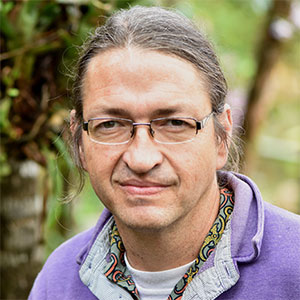“We will present an overview of the institution and the creation of the ethnobotanical garden, the history, ethnography, botany, pharmacology and cultivation of some important species, as well as some of our observations with regard to apparent symbiotic relationships amongst certain of the plants and animals in the garden.”
Biography
Dale Millard is a naturalist and biodiversity explorer, with diverse interests and experience in fields ranging from herpetology to ethnobotany. His interest in the study of snake venoms for drug development later led to study of the chemistry and use of plant medicines. Dale has lived and travelled in Indonesia, Brazil and African countries and has worked with traditional healers in these areas, documenting their use of medicinal plants. He has maintained a lifelong interest in the healing role of entheogens and continues to document their use in poorly explored regions of the world. Dale has a special interest in the cultivation of medicinal plants and mushrooms and has taught numerous workshops relating to agro forestry and plant based primary healthcare. He currently works as an ethnobotanical consultant, and advisor within the psychedelic space.
Creation of an Ethnopharmacological plant repository in Southern Brazil. Presentation of a collaborative project to establish a collection of sacred psychoactive medicinal plants at Wasiwaska Research Center in Florianópolis, Brazil.
“These species represent a unique collection of many rare and poorly known fruit trees as well as sacred and medicinal plants.”
Transcript Abstract
The Wasiwaska Ethnobotanical Garden, located in Florianópolis on the island of Santa Catarina, in southern Brazil, is part of the Wasiwaska Research Center for the Study of Psychointegrator Plants, Visionary Art and Consciousness, created in 2001 by Colombian/Finnish anthropologist Luis Eduardo Luna and Brazilian cultural manager Adriana Rosa. The garden, to a great extent the result of the advice and collaboration of South African naturalist Dale Millard, during his visits to the institution, has been designed and developed largely around agroforestry principles. Land use incorporates three main activities, botanical collection and preservation, agroforestry and food production and reforestation. A private botanical garden comprises around four hundred species that surround the house and adjacent buildings. These species represent a unique collection of many rare and poorly known fruit trees as well as sacred and medicinal plants. The botanical garden gradually extends towards an independent project, which aims to reforest a patch of former Coastal Atlantic Forest (Mata Atlántica), which lost its primary vegetation due to several hundred years of occupation by colonists originally from the Azores islands who cultivated manioc, sugar cane and coffee. We will present an overview of the institution and the creation of the ethnobotanical garden, the history, ethnography, botany, pharmacology and cultivation of some important species, as well as some of our observations with regard to apparent symbiotic relationships amongst certain of the plants and animals in the garden.

